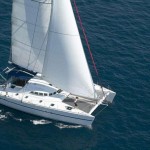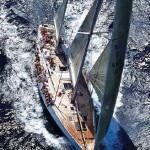Both the Ionian and the Aegean Seas have two very important characteristics: they are not very deep and there are a lot of islands. This means that the wind picks up the waves, waves that are short and steep. In order to face these types of waves, you will much better off with an easily movable boat that has much weight. This way the heavy mass can overcome the resistance of the waves.
The catamaran is extremely light and very wide. With these types of waves, especially if you are navigating against the wind, a catamaran literally has ‘the stability’ of a piece of paper placed on water. Need I describe the discomfort this causes to the passengers? In addition, in these cases, it is extremely slow and does not advance well.
Another consideration is the fact that most Greek islands have tiny little ports (not big, comfortable and well serviced marinas!), and every inch of width you have to consider above that of a standard mono-hull boat is a big issue! This makes it close to impossible getting a space in the port after a long day at sea.
The catamarans are welcome and advisable when sailing an ocean, like the Caribbean archipelago, for example, where the oceanic wave is very long and constant. The oceans also have massive marinas available that have no shortage of room for larger vessels.
Bottomline: go for a monohull and not a catamaran in Greece.
vs


